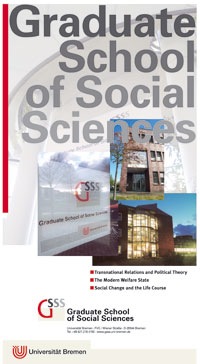By offering the Master's Degree in Social Policy, the ZeS considerably contributes to the profile formation in teaching within the Social Sciences.This M.A. programme renders possible to use the internationally recognized ZeS research profile also for teaching purposes. The Master in Social Policy complements the socio-scientific programmes by an additional research-focused M.A. programme - which greatly complies with the University's research profile in Social Sciences. Further, the programme bridges a gap between the existing B.A.-programmes and the doctoral level. Hence, the specialisation available so far can be further expanded with integrated courses. This offer ranges from a first degree to a second degree including a dissertation.
In Germany, this M.A programme is unrivalled. Due to the research structure available, the University of Bremen has the best offer for an internationally competitive and research-based programme in the field of Social Policy Research. This is mainly thanks to the Centre for Social Policy Research, with its interdisciplinary orientation, its focus on the entire range on welfare state institutions, as well as the close interrelation between application-oriented and basis research.
Moreover, within the framework of the Collaborative Research Centre 597 "Transformations of the State", an increasing number of research projects investigates the transformation of Western welfare states. Further support is ensured by the programme's integration into the Departments Social Sciences, Health and Human Sciences, and Economics, as well as the close cooperation with the Department Law which offers courses in employment and social law. Thus, the programme is based within a wide range of socio-scientific disciplines, e.g. Sociology, Economics, Political Sciences, Law, Health Care Science, Ergonomics, etc..
This extensive research and teaching infrastructure allows the University to offer another research-oriented Master programme - specialized on welfare state research and social policy - which, among others, also aims to build upon the B.A. programmes in political sciences and sociology. The programme therefore fulfils the University's key objectives, i.e. multidisciplinarity, high quality in teaching and research, practical relevance, social responsibility, and the internationalization of teaching and research.
Source: Comprehensive Report 2002 - 2004, Centre for Social Policy Research


















